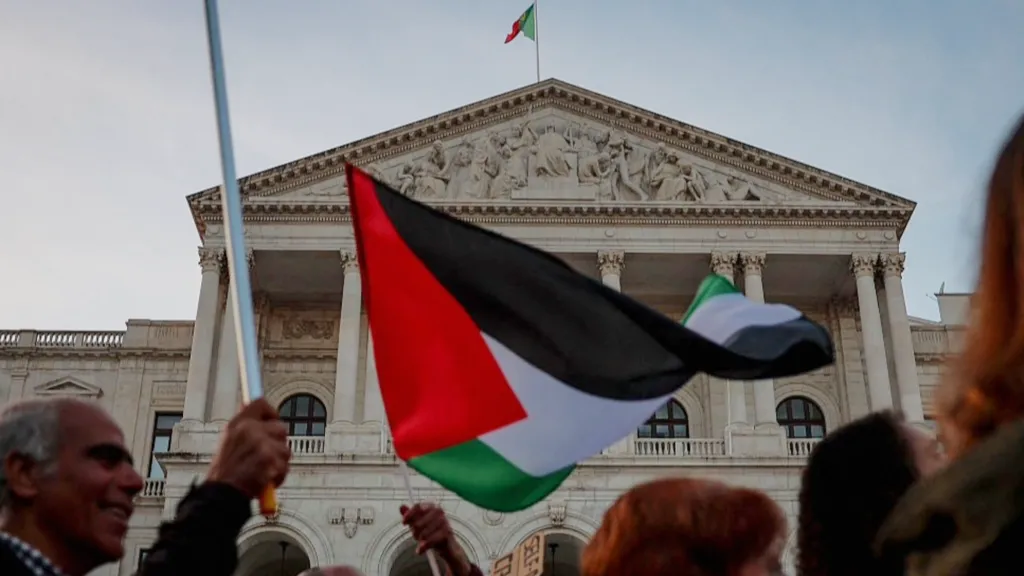Palestinian State Recognition: Portugal Confirms Landmark Decision
The debate over Palestinian state recognition has taken a dramatic turn after Portugal officially confirmed it will recognize a Palestinian state this Sunday. The announcement comes at a time when the war in Gaza continues with no signs of slowing down, raising global attention and political tensions across Europe and beyond.
The Portuguese foreign ministry revealed the decision just days before the United Nations General Assembly (UNGA) meets in New York. The timing signals Portugal’s determination to join a growing group of Western nations reconsidering their stance on Palestine amid one of the deadliest conflicts in recent history.

Palestinian State Recognition: Why Portugal’s Move Matters
For decades, the recognition of Palestine has divided the international community. About three-quarters of the UN’s 193 members already recognize a Palestinian state, which was granted non-member observer state status in 2012.
By moving forward with palestinian state recognition, Portugal positions itself alongside other Western nations, including France, the UK, Canada, and Australia, who are reportedly preparing similar announcements. This marks a significant policy shift, especially among countries that historically maintained caution in officially recognizing Palestine.
Israel and the US Strongly Oppose Recognition
Israel has harshly criticized Portugal’s move, with Prime Minister Benjamin Netanyahu calling it an act that “rewards terror.” He referenced Hamas’s 7 October 2023 attack on Israel, which killed around 1,200 people and led to the abduction of 251 others.
The United States, Israel’s closest ally, echoed this criticism. Speaking in London during a state visit, US President Donald Trump stood beside UK Prime Minister Sir Keir Starmer and firmly rejected recognition of Palestine at this time.
This united front highlights the deep divide between much of the Western bloc and countries seeking to align with the UN majority on palestinian state recognition.
Global Context: The Gaza War and Humanitarian Toll
Portugal’s decision cannot be separated from the ongoing war in Gaza. Since Israel launched its military campaign in response to the Hamas-led attack, the conflict has escalated into one of the bloodiest chapters in recent memory.
-
Deaths in Gaza: At least 65,141 Palestinians have been killed in Israeli strikes, according to the Gaza health ministry.
-
Displacement: Thousands of families continue to flee as Israeli tanks and troops advance deeper into Gaza City.
-
Humanitarian crisis: Food, water, and medical supplies remain critically scarce.
The timing of palestinian state recognition reflects not just political positioning, but also a moral statement amid mounting civilian casualties.
Portugal’s Place in Europe’s Shifting Policy
Portugal is not acting in isolation. Discussions within the European Union have grown more urgent as public pressure mounts on governments to respond to the Gaza conflict. Several EU member states are facing domestic calls to adopt a firmer pro-Palestinian stance.
Analysts argue that Portugal’s bold decision could push other nations over the edge, accelerating a wave of palestinian state recognition across Europe in the coming months.
Palestinian State Recognition: Support vs. Opposition
Supporters of Recognition
-
Argue it strengthens Palestinian diplomatic legitimacy.
-
Believe it could pressure Israel into renewed peace talks.
-
Say it sends a clear message against occupation and civilian suffering.
Opponents of Recognition
-
Claim it undermines negotiations by rewarding Hamas-linked leadership.
-
Fear it weakens Israel’s security in the region.
-
Insist recognition must come only through direct Israeli-Palestinian negotiations.
This clash of perspectives shows how palestinian state recognition is far more than a symbolic act; it is a diplomatic gamble with real-world consequences.

UN General Assembly Spotlight
The upcoming UN General Assembly is expected to bring this issue to the forefront. With Portugal’s recognition announcement landing days before the global summit, world leaders will be forced to address the growing divide.
It remains uncertain whether major powers will shift their stance, but the momentum toward palestinian state recognition is undeniable.
Historical Background: A Struggle for Recognition
The Palestinian Authority has long campaigned for full UN membership and international recognition. Despite majority support from developing nations, key Western powers blocked progress in the past, often citing Israel’s security concerns.
Portugal’s latest move suggests a growing willingness among Western democracies to break from tradition, particularly as images of destruction in Gaza dominate global headlines.
Could Recognition Change the Conflict’s Course?
Experts remain divided. Some believe that widespread recognition could reshape the diplomatic landscape, forcing new negotiations and potentially reducing violence in the long run.
Others warn that without Israeli and American support, palestinian state recognition may remain symbolic, fueling rhetoric but failing to change realities on the ground.
Conclusion: A Defining Moment for Europe and the Middle East
Portugal’s announcement adds a powerful voice to the growing chorus of nations recognizing Palestine. Whether this decision sparks peace, intensifies divisions, or shifts alliances, one thing is clear: palestinian state recognition is no longer a fringe debate.
As the UN General Assembly approaches, the world is watching closely. Will other Western powers follow Portugal’s lead, or will opposition from Israel and the US stall momentum once again?
The answer could redefine global diplomacy in 2025.

